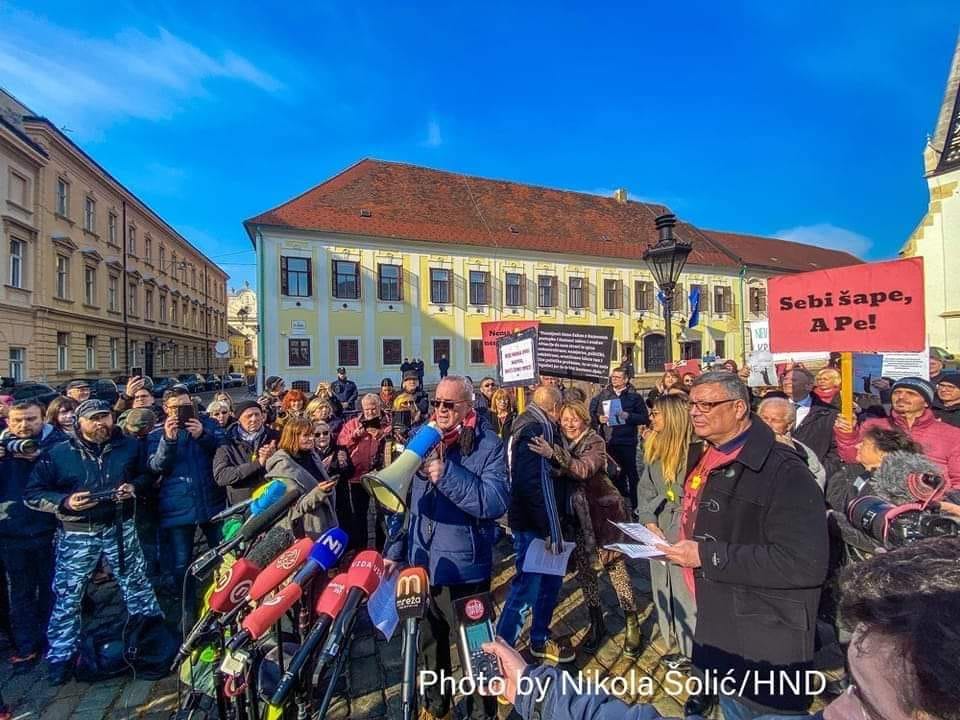
The International Mission for Media Freedom in Croatia highlighted several significant issues related to media law reform, the transparency of state advertising, and the safety of journalists, including SLAPPs. Although some good initiatives have been noticed, Croatia still has a long way to go to ensure a free and independent media environment.
The Media Freedom Rapid Response (MFRR) consortium has concluded its online fact-finding mission in Croatia. The delegation met from September 9 to 20, 2024, with representatives from the Ministry of Culture and Media, the Ministry of Justice, the Ministry of Internal Affairs, a representative from the political party Možemo! in the Media Committee, representatives from the Agency for Electronic Media, the European Union Delegation to Croatia, several publisher associations, representatives from the Croatian Journalists’ Association (HND), the Syndicate of Croatian Journalists (SNH), editors-in-chief, as well as journalists from major media outlets and members of the academic community, lawyers, and civil society actors. Unfortunately, the Supreme Court did not respond to the invitation, and the Judicial Academy declined to participate.
Media Law Reform: Concerns About the Process
The current reform of the Media Law has been strongly criticized by civil society and professional associations, particularly regarding the lack of a consultative process. The previous draft of the law contained controversial provisions, such as allowing publishers undue influence over editorial decisions and politicizing the appointment process for members of the future Media Agency. A new draft is expected in the autumn; however, this has not yet been communicated to the HND and SNH. Nonetheless, MFRR, together with civil society organizations, the HND, and SNH, is prepared to closely monitor the process to ensure its transparency and inclusiveness.
SLAPPs: Ongoing Issues Despite Government Initiatives
SLAPP cases continue to pose a serious threat to media freedom in Croatia, with a high number of complaints despite government promises to address this issue. The Ministry of Culture and Media has established a working group to address SLAPPs, but its effectiveness is yet to be determined. The lack of a unified methodology for registering SLAPP cases in government bodies and civil society remains a challenge. A new working group will be formed in October to develop a plan for the transposition of European Anti-SLAPP instruments, and the Ministry of Justice is currently analyzing the Anti-SLAPP Directive to determine how it could be integrated into the existing legislative framework. However, no clear plans for transposing the Directive into national legislation or any effective measures to address domestic cases have been outlined. Civil society and observers continue to emphasize the need for greater education of judges on SLAPPs. Numerous SLAPP cases arise from within the judiciary itself, aimed at silencing critical reporting. Defamation remains a criminal offense in Croatia, with no announced plans for its decriminalization despite repeated calls from local stakeholders and international organizations for freedom of speech and press freedom.
Transparency in Government Advertising and Independence of the Public Media Service
Transparency in government advertising allocations to media houses is a significant issue, especially at the local level. Many institutions do not disclose this data, raising concerns about its impact on editorial independence. Recent calls from the far-right Homeland Movement to suspend funding for Novosti, a newspaper serving the national minority, have intensified concerns about political pressure and the government’s refusal to uphold media freedom. Additionally, the lack of independence of the public media service HRT has been a recurring issue highlighted by several stakeholders. This concern is directly linked to the implementation of the European Media Freedom Act (EMFA). However, state institutions did not share any concrete plans with the delegation for its transposition.
Agency for Electronic Media: Risks of Politicization
The current process of appointing members of the Agency for Electronic Media risks politicization, as candidates are chosen by the government, and parliament approves them by a simple majority. Stakeholders have proposed that appointments should require a two-thirds majority to ensure greater independence and reduce political interference.
Journalist Safety: Positive Steps, but More Ambition Needed
We commend the recent agreement between the Ministry of Internal Affairs, the Croatian Journalists’ Association (HND), and the Syndicate of Croatian Journalists (SNH), resulting in two protocols aimed at improving journalist safety during public protests and investigations into attacks against journalists. However, further steps are needed to ensure these protocols are effectively implemented at the local level. The protection of journalists’ personal data in legal proceedings related to attacks remains another issue. Additionally, our discussions with stakeholders revealed that politicians, especially when dealing with investigations related to corruption, often engage in defamatory campaigns against journalists, particularly women. Such rhetoric undermines the role of a free press and discourages critical reporting.
Access to Information: Ongoing Challenges
Journalists continue to face obstacles in accessing information from the Commissioner for Access to Information, with delays and refusals being common. This hampers their ability to report timely and accurately on matters of public interest. The mission in Croatia clearly indicated that, while some positive measures have been announced to address media freedom issues, significant challenges remain. Civil society, journalistic associations, and international monitoring bodies will continue to closely follow these issues and urge the Croatian government to prioritize media freedom as a cornerstone of democracy.
The Media Freedom Rapid Response (MFRR) will publish a comprehensive report on its findings in the coming months. We sincerely thank all the interlocutors who took the time to meet with us and share their insights. The mission was led by ARTICLE 19 Europe, together with the European Federation of Journalists (EFJ), joined by partners from the European Centre for Press and Media Freedom (ECPMF), the International Press Institute (IPI), Free Press Unlimited (FPU), and Osservatorio Balcani Caucaso Transeuropa (OBCT).
This statement was prepared as part of the Media Freedom Rapid Response (MFRR), a mechanism operating across Europe that monitors, oversees, and responds to violations of press and media freedom in EU member states and candidate countries.